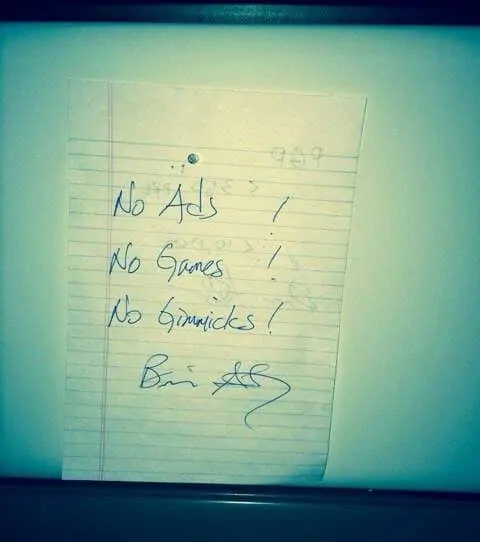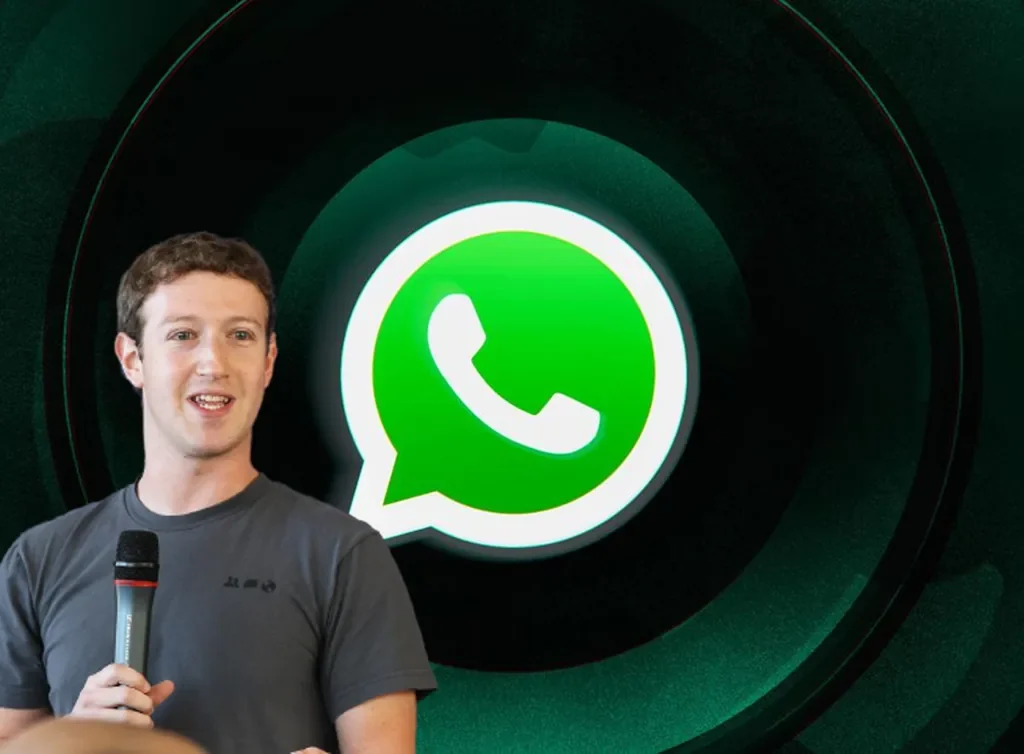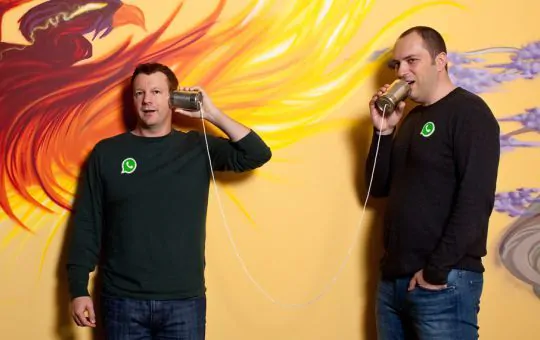Do you know how many people are on the internet around the world? It’s almost 5.4 Billion people and out of these How many use WhatsApp? It’s 2.4 Billion i.e. almost 2.4 billion people use WhatsApp on a monthly basis. For comparison Telegram has only 500 million users and Signal 40 million users.
WhatsApp easily is the most used messaging app worldwide with over 100 billion messages exchanged daily and no other app even stands close but ever wondered How Does WhatsApp Make Money?
Table of Contents
- The WhatsApp Story
- How WhatsApp Made Money?
- How WhatsApp Makes Money Today?
- Monetization and Future Outlook
The WhatsApp Story
WhatsApp was founded in 2009, by former Yahoo! employees Brian Acton and Jan Koum, but how did they do it?
It all started when Jan Koum purchased an iPhone back in 2009 and got an idea to create an app where a person could post his status as to what a person was doing and let his/her friends know whether he/she was busy or available for a call.
Jan got this idea when he got tired from all the missed calls when he was at the gym and wanted his friends to know that he was not available to take their call.
“We didn’t set out to build a company. We just wanted to build a product that people used”, said Koum in an interview.
Jan then told about this idea to his friend Brian Acton, who immediately agreed but since none of them were good at coding for IOS, they hired a Russian developer, Igor Solomennikov, from RentACoder.com.
They named the app ‘WhatsApp’ as it sounded like What’s up but what really made the app great was a pivot which happened when in June of 2009 when Apple launched push notifications for iPhone and the duo capitalized on it, by sending push notifications to friends of a person whenever he changed his/her status on the application.
And in no time, this feature became a channel for instant messaging among users as people started chatting with each other through their statuses.
The duo recognized the opportunity and cashed in on it by deciding to change the app into a messaging app and it was a breakthrough success and hit 250,000 users within a few months.
People just loved the idea of logging in with a phone number and sending messages through the internet instead of using SMS plans to communicate.
Also Read: How Hyundai Became a Global Auto Giant: From Budget Cars to EVs and Robotics
How WhatsApp Made Money?
Although WhatsApp hit the Top 20 U.S. Apps in 2011, WhatsApp needed money to survive, Why? Because the founders had early on decided that they would not run the platform like traditional social media companies, which had an ad-based business model that used users’ private data to show them ads by various advertisers.

But Brian and Jon were clear they will not violate users’ privacy to show them ads and all their messages will be encrypted (i.e. will only be shown to the person to whom it is sent).
Although ads could be an easy way out, they refused to go that route and decided to monetise WhatsApp by charging customers an annual fee of $1 which would begin from the second year, i.e. the app would be free for the first year.
But the revenue from this was dwarfing the exponential rate at which the users were growing and with each new user, there had to be a text verification which was expensive.
WhatsApp was in need of money, so in February of 2011 they got funding from Sequoia Capital and raised $8 Million at a $250 Million valuation and later in 2013, they raised $50 Million at a $1.5 Billion valuation.
WhatsApp was growing at an exponential rate and this got Mark Zuckerberg’s attention (the founder of Facebook), as he saw WhatsApp as a potential threat to the dominance of Facebook.
So Mark in February of 2014, made an offer to Brian and Jan that was just too good to refuse, $19 Billion.
A figure that at the time seemed too big for a messaging app and the world just could not make sense of it, $19 Billion for a company with just 55 employees at the time, WHAT? REALLY?

No one could understand what Mark saw in WhatsApp? for him to make such an offer, But Mark saw it as a future cash cow and a monopoly in the social media space, WhatsApp at the time had 450 Million monthly active users that were highly engaging and saw it further growing it many folds when the app will enter new countries, similar to Facebook and Instagram (that he acquired in 2011 for just a billion dollars).
So, What changes did Mark make to WhatsApp?
First thing that Mark did was say bye-bye to the pay-per-user revenue model that WhatsApp had at the time and made it free to use for all users.
And for a long time did not at all monetize WhatsApp through ads or any other way, so many were wondering how it was making money?
There was a lot of speculation that Mark was using data of users from WhatsApp to show them targeted ads on Facebook and Instagram, which directly resulted in violation of privacy policy and encryption that Brian and Jan stood for.
And as WhatsApp was moving away from its roots, Jan and Brian felt violated as at the time of acquisition of WhatsApp, Zuckerberg had promised the founders that WhatsApp will remain independent from Facebook and Instagram.
Hence, user privacy will not be violated for running ads but as WhatsApp moved further away from its business model, Jan and Brian could no longer take it with Brian leaving WhatsApp in September of 2017 to work on his own nonprofit Signal Foundation (a free, secure messaging app that focuses on privacy) and Jan left in April of 2018 over disagreements over user privacy and encryption.
So just 4 Years after WhatsApp’s acquisition by Facebook both the founders were out.
How WhatsApp Makes Money Today?
In 2018, just after Jan left, the company launched WhatsApp for Business API, where big businesses integrate to provide a seamless customer experience for example: Hotel booking apps sending confirmation messages, Banks sending communication messages and so on.
WhatsApp offers a 3-tiered fee structure for different types of business conversations for different business needs:
- Marketing Conversations (High Fees): WhatsApp earns around 60-70% of their revenue from this, Businesses send marketing or promotional messages under this category.
- Transactional/Authentication Conversations (Medium Fees): WhatsApp earns around 30-40% of their revenue from this, Businesses here send verification messages and updates on transactions under this.
- Customer Service Conversations (Low Fees): WhatsApp earns around 10-20% of their revenue from this, Businesses such as Netflix, Booking.com and others integrate WhatsApp for customer service, such as addressing customer queries or other issues.
Another way WhatsApp is planning to monetize its platform is by WhatsApp Pay. It is an in-app feature that allows users to make payments to each other within the chat itself.
Although it is free to use right now, maybe in the future WhatsApp will either charge all users a little bit of fee on the transactions or keep it free for users but charge businesses a bit of fee on the money received from users on the WhatsApp platform.
Monetization and Future Outlook
Meta (Facebook’s Parent Company) sees WhatsApp Business as a significant driver of its revenue in the future with estimates ranging from $10 to $20 Billion within the next 5 to 7 years.
And beyond Business Messaging and WhatsApp Pay, it continues to explore monetization options such as click-to-messaging ads and advertising within channels. As its user base is expected to reach over 4 billion users by 2027, it will become a very lucrative platform for advertisers worldwide.
